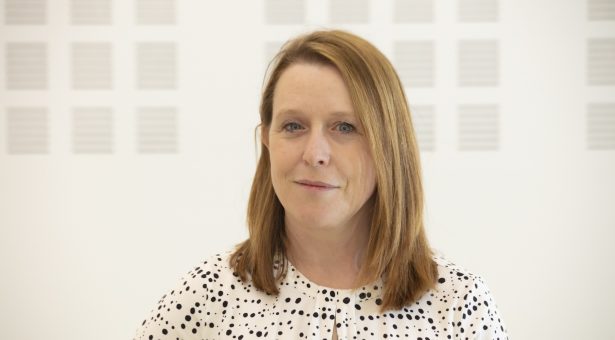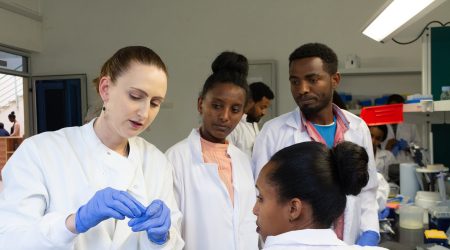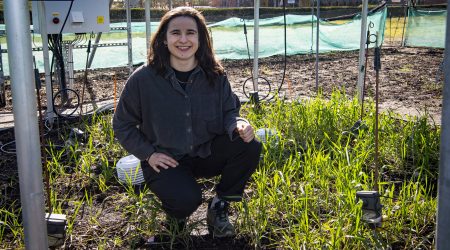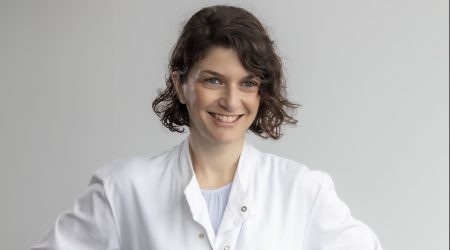Stepping out of the lab to gain a fresh perspective on research

Dr Penny Hundleby is a Senior Scientist specialising in the development of genetic modification (GM) and gene editing (GE) technologies for UK crops, supporting UK and international researchers by providing transformed plants for their research.
Joining the John Innes Centre 27 years ago as a Research Assistant working with Dr Judith Irwin and Professor Phil Dale OBE, Penny studied her PhD part-time whilst working through The Open University.
Penny is also an Honorary Lecturer at UEA, a Director of the International Society of Plant Molecular Farming and the John Innes Centre lead for the Technicians Commitment.
Asked what brought her to the John Innes Centre in the first place, Penny explains, “A lecturer during my undergraduate degree did his PhD at the John Innes Centre and he talked very excitedly about his experience and time here. This enthusiasm made me hunt out the John Innes Centre’s annual report, before websites existed.”
“During my degree I’d spent my industrial placement at the Forestry Commission in Edinburgh, doing tissue culture on trees, so I looked for research groups at the John Innes Centre that used similar skills and found Phil Dale and made contact with him.”
Penny’s expertise in crop transformation techniques like Genetic Modification and Genome Editing and her ability to communicate clearly about complex biological processes, means she spends some of her time working to showcase the technologies used for crop transformation to a wide range of people.
Over the last few years, this has meant engaging with industry, policymakers and the media to collaborate, provide evidence and to share the cutting-edge research that the Crop Transformation team do here at the John Innes Centre.
Penny can regularly be found meeting and speaking to teachers, students, farmers, MPs, lobby groups and lawyers about the technology and its legislation in the UK and in the EU.
In 2021, Penny wanted to take on some new challenges to broaden her horizons and to experience life outside the lab.
After some research, and a few conversations, she applied for a Flexible Talent Mobility Account (FTMA) and took the opportunity to work for four months part time with the Anglia Innovation Partnerships LLP, the company that runs the Norwich Research Park.
The FTMA allows skills to be transferred between two working environments by enabling the movement of researchers and technicians between industry, internationally or with organisations that work closely with research. The aim of the programme is to encourage the sharing of ideas, broaden individuals’ perspectives and provide upskilling experience for future careers.
Penny tells us a little bit about her placement experience, and some of the skills she has brought back to the John Innes Centre.
“I found the FTMA placement to be a great opportunity to widen my networks and to look at how the Norwich Research Park could better promote cross-institute and company networks too. Time away from the lab allowed me to better see how gene editing and crop transformation is viewed, and how it could potentially be expanded to support research and development in industry.
As a direct result of my FTMA placement, I was nominated as a Fellow of the Royal Society of Biology, in recognition of my outreach and public engagement work on GM and gene editing.
During the placement, I enjoyed playing a part in some of the wider engagement activities of the Norwich Research Park. For example, I helped to organise the Nuffield Contemporary Scholars Conference.
Part of this conference was to bring the scholars together with scientists, researchers and technologists to look at some big picture problems facing Agriculture, like water scarcity, working towards net-zero, climate change and emerging technologies.
I could have easily recruited 21 scientists from the John Innes Centre, but I wanted representatives from a cross-section of the park and this diverse group of scientists, together with farmers did not disappoint.
A good example was a discussion about water security. The plant scientists immediately thought about drought tolerance and plant adaptation, whereas groups from UEA asked questions about building better water storage and supply infrastructure (reservoirs, dams etc.,).
Similarly, I was tasked with facilitating a discussion about gene editing to develop disease resistant livestock. Obviously, day to day in the lab I work with plants, so I had to adapt and research about livestock applications for gene editing.
Naturally, I began with a science-based view on how gene editing could produce disease-resistant animals, reducing the need to use antibiotics when raising livestock and having a positive impact on the challenge of anti-microbial resistance.
The farmers in the group opened my eyes to the concept that science alone won’t bring about solutions to huge problems like AMR. They pointed out that it is possible that the introduction of disease-resistant animals could result in more intense farming practice, and a lowering of animal welfare. They also suggested that another approach might be to encourage and embed healthier animal husbandry that produces a similar impact on farm, healthier livestock and less use of antibiotics.
Opportunities like this very much opened me up to looking at things from many angles. So, for me the impact of the decision to bring together people from across the park was clear from these examples, and this was reinforced by the positive feedback as we discussed and tackled big scientific questions together.
My FTMA placement overlapped with an opportunity to take part in the Royal Society Policy Pairing Scheme, and during my week in Westminster I gained knowledge on how Government departments, and Parliament work and how new legislation is brought in. I shadowed someone at the Food Standards Agency and met the team responsible for GM and GE policy for food and feed.
I would recommend this scheme to any scientist wanting to engage with policy makers to gain a better understanding of how their science can influence policy and how policy impacts science. I had such a fantastic week talking with a wide range of scientists, civil servants and ministers, identifying areas where we can better work together.
I came away with an understanding of how Government departments, Parliament, and the government machinery work and I was then able to bring this knowledge back to the John Innes Centre to support the briefing papers and evidence submissions that were submitted to the Houses of Parliament and House of Lords in support of the Gene Editing Bill.
By opening up the FTMAs to science support staff, like myself, I was able to gain a fresh perspective on the wealth of knowledge and transferable skills I have accumulated over my career; the nomination to become a Fellow of the Royal Society of Biology was the icing on the cake.
My top take aways from the placement include knowing more about the opportunities across the Norwich Research Park to widen networks with staff in other research institutes. This is a skill that I can take into my new role as Technician Commitment lead for the John Innes Centre.
To support the Technician’s Commitment and support the careers of others is a real privilege, and I will continue to push for opportunities for technical and support staff both here in Norwich and across the UK.
When it comes to career development, a lot of focus has traditionally been on the scientists, and really it takes a community of staff, a huge team of people, to make an organisation work.
I believe that there are plenty of opportunities for our support staff, and I want to continue to connect the dots, bring people together, share opportunities and build better visibility for the wide range of skills that our technical staff add to the research community.
For me, professional registration to become a Chartered Scientist was a really great process and scheme, providing opportunities for career development, reflection and recognition which I would like more people to get involved with here at the John Innes. The scheme provides ways to support our laboratory staff to complete and track continuous professional development in order to showcase their transferrable skills as they progress.”



